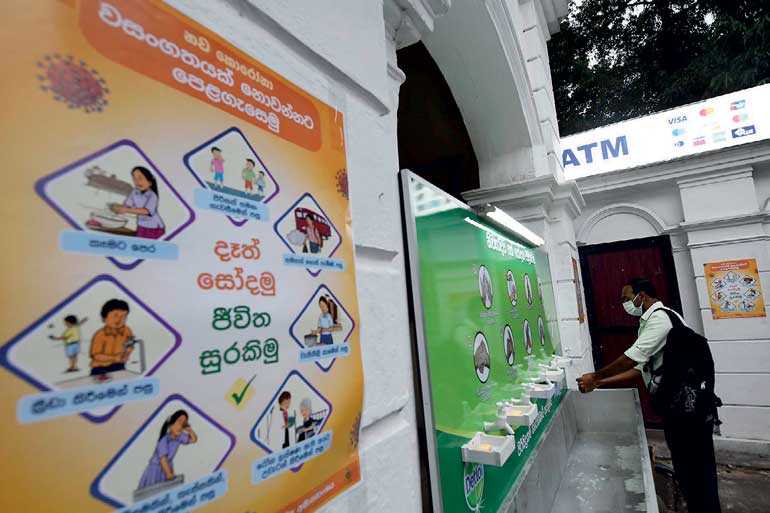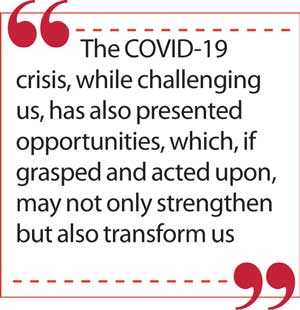Saturday Feb 07, 2026
Saturday Feb 07, 2026
Tuesday, 31 March 2020 00:00 - - {{hitsCtrl.values.hits}}

Culturally, appalling practices like spitting publicly, poor bathroom habits, unwarranted physical contact are ignored, as practices long in use, so perhaps a tradition! COVID-19 has given us an opportunity to break free, inculcate a greater awareness of community, develop a sense of personal space and uplift sanitary standards all around
– Pic by Shehan Gunasekara
Although with a virus as tenacious it is far too soon to bless the day, relative to many other countries, we appear to have done well in containing and even preventing the spread of the dreaded COVID-19 thus far. 
In terms of numbers (of the afflicted), for a densely populated island, Sri Lanka’s figure of only one hundred plus two (as of 25 March), gives reason for optimism. Many Developed countries, possessed of much more resources and advanced medical facilities, are stricken badly, with daily mounting fatalities. COVID-19 is a great equaliser.
All the “Kng’s horses and all the King’s men” of the Developed countries in the form of nuclear submarines, fighter planes and war tanks give no protection against the virus. Today, they find themselves in the same boat as the poor recipients of their development aid. Such is the enormity of the contagion that it is commonly said that some of these rich countries have given up on the afflicted elderly, concentrating on protecting the rest of the population.
This however may be more a misconception than the reality, arising out of the hour by hour responses of a medical establishment overwhelmed by an unprecedented crisis. Almost all developed countries have ageing populations, it should be noted.
Small is beautiful in more ways than one. Unlike continental countries, it is easier to lockdown a smallish island. As a country, we are also very well connected via the internet and mass media, particularly the TV and radio, invaluably useful for the purposes of informing and regulating.
Although we import a large percentage of the food we consume, including the staples, the country also produces a rich bounty of rice, yams, vegetables and fruits, a definite advantage in a global lockdown. 
Despite the prolonged dry season, we have experienced for several months, mercifully, it has not been necessary to have either a power or a water cut so far. When this nightmare is over finally, we ought to be on our feet reasonably fast. A small economy, can recover much faster than huge economic systems, provided adequate stimulus is given.
Lessons from the crisis
Lessons can be drawn from every crisis. If we don’t learn, we are doomed to repeat our failures. This virus, highly contagious as it may be, is not inescapably fatal.
On the other hand, with the new coronavirus, the recovery rate of the afflicted is even better than the common influenza. The virus is containable with standard methods of isolation and control. However, the next plague may not be that easily contained nor treated. It is imperative that each country develops disaster management plans for different scenarios, based on their particularities and resource base.
Although we have had a Disaster Management Ministry for many years now, once again, we were evidently caught unprepared, without adequate medical aids, including even basics like masks and gloves. The insufficiency of hospital beds for a wide-spread pandemic like the COVID-19 is talked about endlessly. Every disaster, whether it be a tsunami, a flood or an epidemic, catches the country unprepared, everybody running around like headless chickens when disaster strikes.
When on 24 March, the curfew was lifted for a few hours, there was a massive run on staples like rice, potatoes, flour, biscuits, milk, soon emptying the shelves of most supermarkets. Those who were behind in the long queues had hardly anything to buy. This is an outcome a disaster management plan can readily anticipate.
Rationing purchases, in addition to keeping the supply chains buzzing is a solution that could be considered. By rationing, we can ensure that there is something for the kitchens of all, rather than a few walking away with everything.
While on the matter of disaster management, another element generally ignored in this country is the potential of volunteers in an overwhelming nation-wide crisis such as this. When facing a crisis of this magnitude the administration has too much in its hand, and certain things are handled more empathetically by local volunteers.
A friend of mine, a young barrister in London, told me that she had joined a group of volunteers of her municipal ward to help out in this world-wide crisis. Their main function is to assist the elderly in the area, particularly those who are unable to go by themselves to the stores or the pharmacies for their regular provisions or medicine. At least once a day, a volunteer would knock on the door of these helpless senior citizens.
As I write, there is news that the police are enforcing the curfew strictly, even arresting the violators. Undoubtedly, it is the duty of each citizen to cooperate with the authorities in this hour of peril. However, by arresting curfew violators I hope that inadvertently we are not creating another situation which can spread the virus. If one of the curfew violators happens to be a carrier of the virus there is a risk of him passing it on to whoever is near him.
Politicians teach (theorise) as country convulses in crisis
Typically, while the medical professionals, public servants and the forces are battling round the clock to contain the spread of the COVID -19, our politicians called for a meeting of leaders of political parties to map out a response to the threat. Many of those present have been monopolising political office for decades now, and are very much a part of our failure, if not the direct cause. If anything, the forum provided them with an opportunity to ventilate their theories for disaster management, yet the outcome is uncertain.
You do not need common place suggestions like testing fishermen for the disease or getting down ventilators, if common sense prevails in high places. This is too basic for a national level meeting. While the contagion poses an imminent threat, even the possibility of locally turning out the much-needed ventilators was discussed. Apparently, this is yet at a concept stage; bringing out a prototype, ironing out the glitches to the eventual commercial model is treated with facile generalisation, child’s play. And we are a country which has no industrial base to speak of, not even making a transistor radio or a light torch. As the pithy saying goes, they who can, do, while those who cannot, teach! Our politicians teach (theorise), the country convulses in crisis.
Every institution/person in this country would come out of this crisis more alive to the need for preparation and perhaps even the imperative to modernise. There is presently a heightened awareness of personal hygiene which ought to be a standard rather than a short-lived reaction to a viral threat.
Long before the COVID-19, it was confirmed to me by an assistant at a so called premier supermarket that their trolleys and baskets are never washed, despite hundreds of customers using them on a daily basis. The same is true of many public places and public transport, functioning in deplorable conditions, hygiene wise.
Culturally, appalling practices like spitting publicly, poor bathroom habits, unwarranted physical contact are ignored, as practices long in use, so perhaps a tradition! COVID-19 has given us an opportunity to break free, inculcate a greater awareness of community, develop a sense of personal space and uplift sanitary standards all around.
System of queues
The stresses of the crisis, especially the compulsion to stock the larder during the short non-curfew hours (on Tuesday 24 March), brought about a system of queues before all shops and supermarkets in the city. These were not externally imposed, although in certain places there were a few constables present, but by and large, the discipline was by internal compulsion. The desperate shoppers would tolerate no breaking of the queue, in a few hours the curfew would kick in.
Although a queue could be considered a symbol of civility, for many a Sri Lankan, it goes against the grain to stand in line, considering it an indication of a lowly status. In most countries, an exception would be made for the infirm or the ‘weaker’ sex, but here it is the ‘powerful’ or the ‘well- connected’ that gravitate to the top of the line, even trampling the infirm. But in the desperate lines of frantic shoppers that day, no such nonsense was accepted, first come was first served.
We can only hope that this develops to a national norm, breaking the queue becoming an embarrassment, not standing in one.
It was suggested that during the curfew hours the employees could work from their homes. Working away from office needs pre-preparation; if the infrastructure was in place, we could have saved billions in lost hours, workers continuing to work productively from their homes. As it is, only a very few of those confined to home could contribute meaningfully.
The COVID-19 crisis, while challenging us, has also presented opportunities, which, if grasped and acted upon, may not only strengthen but also transform us.